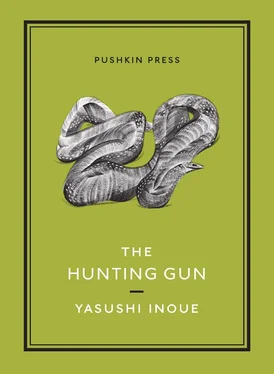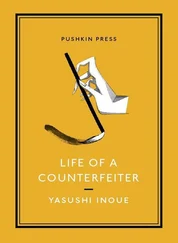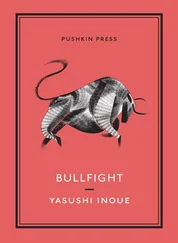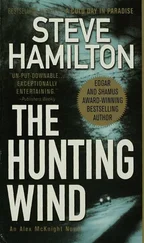In the eyes of one who has glimpsed such a youth, all other men seem equally common, drearily dull. If at any point your wife ever felt even a few brief sparks of unchaste longing, that was the day — when she was drawn to the goat boy. Thinking of him now, picturing his taut skin moist with desert dew… but no, more than that it is the cool purity of his extraordinary fate that stirs up crazed waves in my heart even after all this time.
The year before last, I believe it was, there was a period when I became infatuated with a painter in the New Life School, a man by the name of Matsuyo. I would find it rather galling if you were to take as straight fact the rumours that circulated then. I recall that in those days there was a strangely sad gleam in your eyes, verging on pity, when you regarded me. Although I had done nothing to deserve your pity! Even so I was attracted to your eyes then, just a little. You were wonderful, even if you did not quite reach the goat boy’s level. Why, when you had such a marvellous look in your eyes, did you not let them rove a little? Stoicism is not everything, you know. Your gaze remained fixed so steadily on my face that you might as well have been examining a piece of pottery. And so I myself became as crisp and cool as old Kutani ware; I was seized with the desire to go and rest somewhere, absolutely still, and so I went and sat for Matsuyo in his chilly studio. That said, I still greatly admire his architectural vision. He is perhaps somewhat too like Utrillo for his own good, it is true, but one would be hard pressed to find another painter currently active in Japan who is capable of suffusing into paintings of utterly hopeless buildings such a thoroughly modern aura of melancholy, and of doing so, moreover, with such understatement. As a person, though, he was no good. A total failure, in fact. If you stood as the marker for a hundred points, he would have been, at best, a sixty-five. He may have had talent, but there was something nasty about him; his features were well proportioned, but he was sadly lacking in grace. He looked comical rather than thoughtful with his pipe between his lips; he had the face of a second-rate artist whose works had absorbed everything good in him, and only what was good.
Then last year, in early summer, I believe it was, I showed some affection to Tsumura, the jockey who rode Blue Glory to victory in the Ministry of Agriculture and Forestry Cup. This time your eyes shone less with pity than with cold, contemptuous malice. At first I thought it was the leaves outside the windows that made them look so green when we passed in the hall, for example; later on I realized how ridiculously mistaken I had been. It was very sloppy of me, I admit. Had I recognized the true cause, I could have prepared myself mentally to cast back some answering gaze of my own, whether cool or warm! But in those days I was in the throes of a fascination with the beauty of speed that made my whole body go numb; your medieval approach to the demonstration of your feelings could not have been more alien to my sensibilities. I would have liked, at least once, to let you see the pure hunger to win that claimed Tsumura as he clung to the back of that peerless mare, Blue Glory, galloping in a beeline past more than a dozen other horses, one after the next. I know you, too, would have felt your blood rise on catching a momentary glimpse of his earnest, lovable form — I am talking, of course, about Tsumura, not about Blue Glory — through your binoculars.
When he was only twenty-two, that somewhat unruly-looking youth drove himself against the greatest odds to set two new records, all because he knew I was watching him through my binoculars. Never before had I witnessed such passion. So intent was he on earning my praise that he forgot me altogether once he was astride that dark-brown mare, transfiguring himself into a demon of speed. Yes, I lived then, above all, for the joy of seeing the love I felt up in the stands — it was, indeed, a species of love — be transformed into a passion as limpid as water that he then proceeded to stir, circling around and around that great 2,270-metre oval. I feel not a trace of regret for having given him as a reward three of my diamonds that had survived the war. But that young jockey was lovable only as long as he was perched on Blue Glory’s back; the moment he descended to earth, he was just an imp incapable of appreciating even the flavour of a good cup of coffee. The dauntless, headlong drive to win that he had cultivated astride his horse made it somewhat more thrilling to take him around than that writer Senō or the one-time leftist Mitani, but he had nothing else to offer. This was why, in the end, I took the trouble to introduce him to a dancer I had taken under my wing — the eighteen-year-old with the slightly upturned lip — and even saw them through the wedding.
I fear my pleasure in chatting with you like this has led me from my topic. What I meant to say is that while I may withdraw to Yase, up there to the north of Kyoto, I am by no means prepared at this point to withdraw from the world. I have no intention whatsoever of going off and devoting myself to religious austerities. I will leave you to light your kilns and fire your tea bowls; I will grow flowers. I am told one can earn quite a lot sending flowers down to market at Shijō. With the old housekeeper and the maid and two young women I have my eye on we should be able to tend 100 or 200 carnations. For the time being, at least, men will be verboten; I have grown a trifle weary of your masculine rooms. I mean that. I am planning out my life in all earnestness, determined this time to make a fresh start, to find genuine happiness.
You may be surprised by my sudden request that we end our relationship — though, come to think of it, perhaps the opposite is true, and you have been perplexed all along by my failure to make such a request. I myself cannot help being profoundly touched, as I look back, by the fact that I managed to go on living with you for more than a decade. To some extent I have acquired a reputation as a wife of less than impeccable conduct, and I suspect you and I both have left others with the impression that we are an unusual couple; still, we have arrived at this juncture without suffering any social catastrophes, even serving pleasantly together, on occasion, as official go-betweens helping others towards marriage. In this respect, I hope you will agree that I fully merit your praise.
How extraordinarily difficult it is to write a goodbye letter. It is unpleasant to get all weepy, but it is also unpleasant to be overly brisk. I would like for us to make a clean break and to go our separate ways without hurting each other, but a peculiar sort of posturing seems to have found its way into my prose. Perhaps there is no helping it: a goodbye letter is what it is, and it will not be a thing of beauty, no matter who its author is. I suppose I might as well write in a cold and prickly style appropriate to the content. Forgive me, then, for returning your enduring coldness by writing the sort of unabashedly disagreeable letter that will make you turn still colder.
*
It was February 1934, the ninth year of the Shōwa era. I believe it must have been about nine o’clock in the morning when I saw you, dressed in grey Western clothing, walking along the cliff just below my second-floor room at the Atami Hotel. This happened so very, very long ago that it all seems lost in a dream-like haze. There is no need for you to agitate yourself; just listen. How my eyes smarted at the sight of the greyish-blue haori , an enormous thistle woven across its back, that the tall, beautiful woman who came stepping along behind you wore. I had not really expected my intuition to prove so utterly on the mark. In order to confirm it, I had subjected myself to the rocking of the night train, forgoing sleep entirely. To invoke an old conceit, I wished that I were dreaming, and that I would awake. I was twenty years old at the time — the same age as Shōko now. The shock, I must admit, was somewhat too rude for a newly-wed with no sense of what was what in life. I immediately summoned the bell-hop and, faced with his suspicions, invented some excuse and settled the bill; then, unable to remain a moment longer on that spot, I fled outdoors. I stood for a minute on the pavement outside the hotel, holding fast to the searing pain that smouldered in my breast as I briefly debated whether to descend to the shore or go to the station. I started along the road to the ocean, but before I had gone half a block I stopped. I stood staring out at a spot on the wintry ocean where the sunlight glittered against a Prussian blue so perfect it could have been squeezed from a paint tube and smeared across the water; then, changing my mind, I spun on my heel, turning my back on that scenery, and took the other road, the one to the station. Thinking back over the years, it seems that selfsame road has carried me all the way to this point where I stand today. Had I continued down the road to the ocean, towards the two of you, I do not doubt that I would be a different woman now. But for better or for worse, that was not the path I chose. It occurs to me that in all my life, that was the biggest fork.
Читать дальше









![Ричард Деминг - Whistle Past the Graveyard [= Give the Girl a Gun]](/books/412176/richard-deming-whistle-past-the-graveyard-give-t-thumb.webp)

